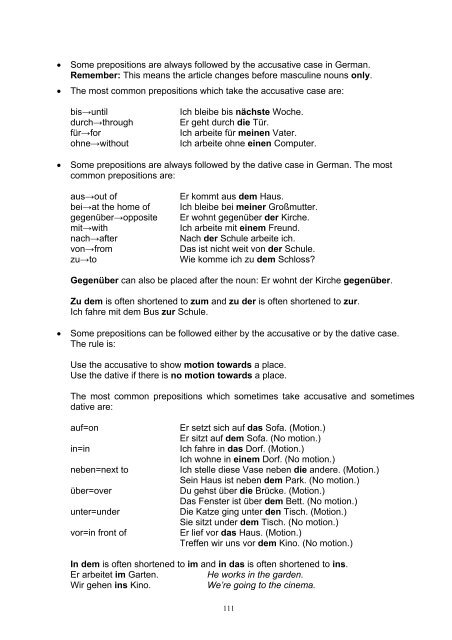VOCABULARY - AQA
VOCABULARY - AQA
VOCABULARY - AQA
You also want an ePaper? Increase the reach of your titles
YUMPU automatically turns print PDFs into web optimized ePapers that Google loves.
• Some prepositions are always followed by the accusative case in German.<br />
Remember: This means the article changes before masculine nouns only.<br />
• The most common prepositions which take the accusative case are:<br />
bis→until Ich bleibe bis nächste Woche.<br />
durch→through Er geht durch die Tür.<br />
für→for Ich arbeite für meinen Vater.<br />
ohne→without Ich arbeite ohne einen Computer.<br />
• Some prepositions are always followed by the dative case in German. The most<br />
common prepositions are:<br />
aus→out of Er kommt aus dem Haus.<br />
bei→at the home of Ich bleibe bei meiner Großmutter.<br />
gegenüber→opposite Er wohnt gegenüber der Kirche.<br />
mit→with Ich arbeite mit einem Freund.<br />
nach→after Nach der Schule arbeite ich.<br />
von→from Das ist nicht weit von der Schule.<br />
zu→to Wie komme ich zu dem Schloss?<br />
Gegenüber can also be placed after the noun: Er wohnt der Kirche gegenüber.<br />
Zu dem is often shortened to zum and zu der is often shortened to zur.<br />
Ich fahre mit dem Bus zur Schule.<br />
• Some prepositions can be followed either by the accusative or by the dative case.<br />
The rule is:<br />
Use the accusative to show motion towards a place.<br />
Use the dative if there is no motion towards a place.<br />
The most common prepositions which sometimes take accusative and sometimes<br />
dative are:<br />
auf=on Er setzt sich auf das Sofa. (Motion.)<br />
Er sitzt auf dem Sofa. (No motion.)<br />
in=in Ich fahre in das Dorf. (Motion.)<br />
Ich wohne in einem Dorf. (No motion.)<br />
neben=next to Ich stelle diese Vase neben die andere. (Motion.)<br />
Sein Haus ist neben dem Park. (No motion.)<br />
über=over Du gehst über die Brücke. (Motion.)<br />
Das Fenster ist über dem Bett. (No motion.)<br />
unter=under Die Katze ging unter den Tisch. (Motion.)<br />
Sie sitzt under dem Tisch. (No motion.)<br />
vor=in front of Er lief vor das Haus. (Motion.)<br />
Treffen wir uns vor dem Kino. (No motion.)<br />
In dem is often shortened to im and in das is often shortened to ins.<br />
Er arbeitet im Garten. He works in the garden.<br />
Wir gehen ins Kino. We’re going to the cinema.<br />
111


